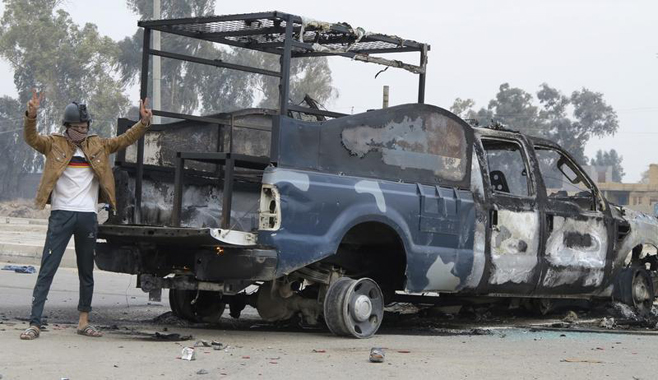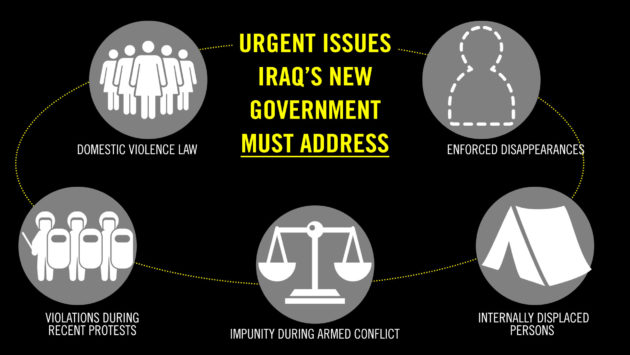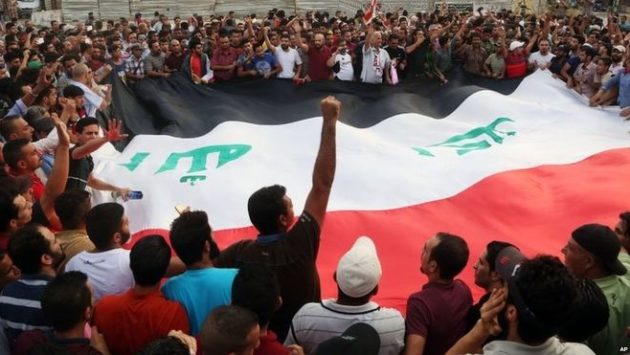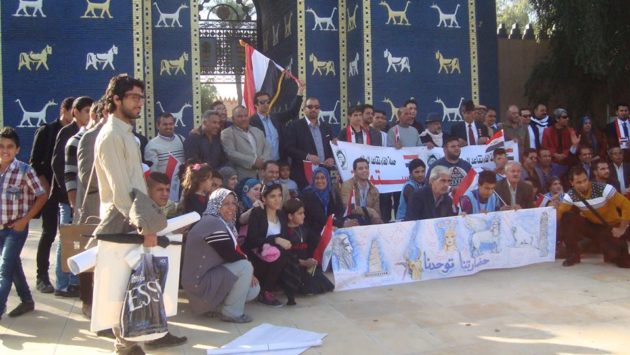Investigate Violence at Protest Camp
Human Rights Watch , JANUARY 4, 2014
Fighting Erupts in Anbar Province After Security Forces, Protesters Clash
“The facts of the Ramadi incident are unclear, but government statements before the clashes and the deployment of the army seemed intended more to provoke violence than prevent it. Seventeen people died at Ramadi and the Iraqi authorities need to find out exactly what happened and why.” Joe Stork, deputy Middle East director
(Baghdad) – Iraqi authorities should immediately order a transparent and impartial investigation into violence between security forces and antigovernment protesters in the western city of Ramadi. The fighting on December 30, 2013, left 17 people dead.
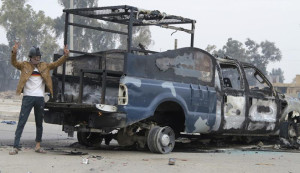
A protester stands next to the wreckage of a police vehicle in Ramadi on December 30, 2013.
© Reuters 2013
The investigation should also look into the apparently related killings of the brother and five bodyguards of a member of parliament, Ahmed al-Alwany, during his arrest on December 28. The authorities should ensure that all those responsible for unlawful killings and other misuse of force are brought to justice.
“The facts of the Ramadi incident are unclear, but government statements before the clashes and the deployment of the army seemed intended more to provoke violence than prevent it,” said Joe Stork, deputy Middle East director at Human Rights Watch. “Seventeen people died at Ramadi and the Iraqi authorities need to find out exactly what happened and why.”
In the early hours of December 30, hundreds of security force personnel descended on the Ramadi protest camp, where 300 to 400 Sunnis were protesting Iraq’s Shia-led government’s alleged use of abusive counterterrorism measures. Two witnesses told Human Rights Watch that at around 6:30 a.m., army and special police (SWAT) forces with at least 30 Humvee military vehicles, 20 pickup trucks, and 18 armored vehicles surrounded the Ezz and Karama square.
Witness accounts differ as to who began the shooting, but an exchange of fire between the security forces and armed tribesmen outside the square resulted in six deaths and ten wounded.
For a week, the authorities had repeatedly threatened to remove the protesters in Ramadi and other largely Sunni areas. Prime Minister Nuri al-Maliki on December 27 accused the protesters of harboring al-Qaeda leaders,saying, “Today will be the last day of prayers at the Ramadi protest site,” and threatened to “burn down” the protesters’ tents. On December 23, Fadel Barwari, the commander of Iraq’s Counterterrorism Service, which oversees the SWAT forces, had said on his official Facebook page, referring to government operations against al-Qaeda in Anbar: “I swear to God I will kill those dogs and those who are with them. I will wipe them out.” He said his soldiers should “stomp them out without mercy.”
On December 28, the Iraqi state news agency reported that 30 armored vehicles had been deployed about 500 meters from the protest camp in Ramadi. In the last year of ongoing protests in Sunni areas, security forces fired on and killed peaceful protesters in at least four other incidents.
After the army surrounded the square on December 30, hundreds of men from local tribes armed with guns who had positioned themselves to defend the square fought back, the witnesses said. One protester told Human Rights Watch that the protesters had dug ditches next to their tents for protection, a precaution “learned after Hawija,” referring to a security force attack on a protest camp in April that killed at least 51 people. “As soon as the fighting started, people threw themselves into the ditches for cover,” he said. Among those killed were three people not involved in the fighting.
One protester said that fighting between city residents and security forces spread throughout the city by 8 a.m. and was still going on at 6:30 p.m., when he last spoke with Human Rights Watch. According to news reports, the December 30 clashes left 17 people dead, and clashes have continued intermittently throughout the week.
“The fighting is all over the place,” another witness, who lived two kilometers from the protest square, said that day. Three other Ramadi residents reported particularly heavy gunfire in neighborhoods throughout Ramadi and Fallujah.
The Ramadi residents told Human Rights Watch that they hid in their homes throughout the day to avoid crossfire. One said he hid under a staircase because “we can hear the bullets whizzing over our heads.”
On December 28, Iraqi army and SWAT forces arrested al-Alwany, a Sunni member of parliament, at his home in Ramadi, claiming officials wanted al-Alwany and his brother on suspicion of terrorism. During the arrest, security forces killed five of al-Alwany’s bodyguards and al-Alwany’s brother, Ali.
Agence France Presse reported a “ministry statement” claiming that the two brothers and their guards had opened fire on security forces, killing one and wounding five. The arrests and the deaths ratcheted up sectarian tensions in the area. A photograph posted on Facebook appeared to show a soldier stepping on Ali al-Alwany’s head immediately after his death.
Defense Minister Saadoun Dulaimi went to Anbar province at the time of al-Alwany’s arrest, apparently to negotiate an end to the protests. When Dulaimi left Ramadi on December 29 at about 9 p.m., he issued a statement that if the squares were emptied within 48 hours, he would release al-Alwany. Immediately following his departure, security forces cut cellular communications and Internet access across Anbar province, according to a Defense Ministry statement to local media.
Ramadi residents told Human Rights Watch that immediately following al-Alwany’s arrest, army and SWAT forces surrounded Ramadi and imposed a curfew, prohibiting residents from driving or entering or exiting the city, or bringing in food or propane.
Ramadi’s protest camp has existed for about a year. In a television interview on al-Iraqiyya channel on the morning of the December 30 raid, a Defense Ministry spokesman, Mohamed al-Askari, denied that the “removing of tents” had “caused any loss of life” and warned of a “media escalation” of events. Al-Mada Press news agency reported that another Defense Ministry source had confirmed that the Ramadi square raid had led to heavy fighting and that security forces had surrounded the city the day before.
The parliamentary speaker, Osama al-Nujaifi, head of the Sunni “Mutahidun” block, said he sent a parliamentary committee to investigate the attack on the Ramadi square, but that forces from Baghdad Operations Command prevented the committee from entering Anbar province on orders from Prime Minister Maliki. Forty-four Sunni members of parliament resigned to protest the security forces raid after Deputy Prime Minister Saleh Mutlak, another leading Sunni politician, called on Sunni members of parliament and government officials to resign.
The United Nations Basic Principles on the Use of Force and Firearms by Law Enforcement Officials state that security forces in policing situations shall “apply nonviolent means before resorting to the use of force and firearms,” and that “whenever the lawful use of force and firearms is unavoidable, law enforcement officials shall: (a) Exercise restraint in such use and act in proportion to the seriousness of the offense and the legitimate objective to be achieved; (b) Minimize damage and injury, and respect and preserve human life.”
The Basic Principles further state that, “Governments shall ensure that arbitrary or abusive use of force and firearms by law enforcement officials is punished as a criminal offense under the law.” Military forces, when performing law enforcement functions, are also governed by these rules.
“The situation in Anbar is only getting worse,” Stork said. “The government should be taking urgent steps to quell violence from all sides.”

